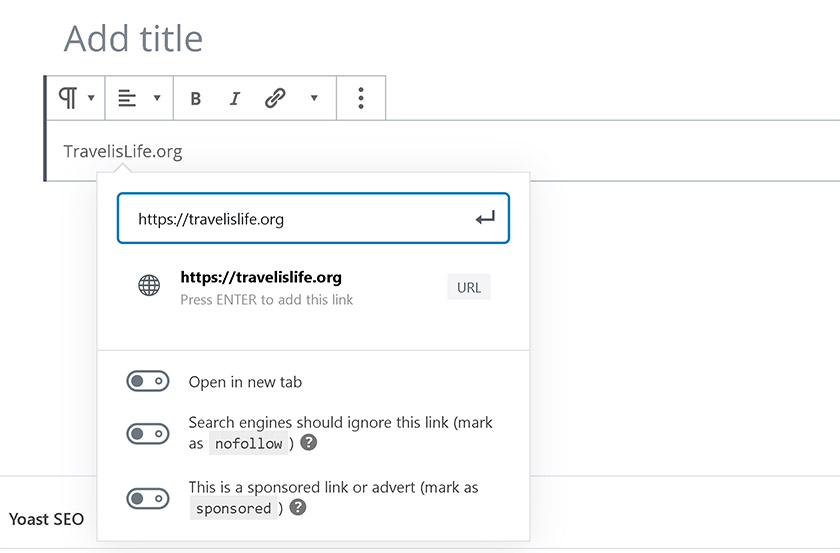Undoubtedly as a blogger you've run into discussion about link types – especially dofollow vs nofollow. And at this point, you probably know that dofollow links are important for your SEO. However did you know that there are actually significantly more link types than just those two popular ones that you hear about?
Today I'm going to teach you about 6 major link types that affect you most as a blogger including dofollow, nofollow, sponsored, ugc, noopener, and noreferrer.
How To Add These Tags To Your Links
These link types are housed in the rel=”xx” tag, where “rel” stands for “relationship”. If you're unfamiliar with what I'm talking about, then most likely you've never switched your WordPress Editor from Visual Editor to Code Editor. When writing WordPress posts in the default Visual mode, WordPress is automatically adding some of these tags on your behalf based on your selection, however, if you were to switch to the Code Editor, you'd see that your links look something like this:
<a href="https://travelislife.org" rel="noopener noreferrer">TravelisLife.org</a>
In the latest version of WordPress, the Block Editor offers you options of tagging a link as nofollow or sponsored, and WordPress automatically tags the link as noopener and noreferrer if you set it to open in a New Tab. So you don't have to worry about learning any code if you're using the latest version of WordPress, but it's important to understand the major link types and know what's happening behind the scenes.

Now let's get into the 6 major link types.
#1 dofollow
Dofollow is your default link. Meaning, if you don't tag the link as anything else, it'll be considered dofollow. In fact, there is no option within WordPress to tag a link as dofollow. The absence of a nofollow, sponsored, or ugc link tag makes the link dofollow, so no special tagging is required. However a link can be simultaneously be dofollow if it's tagged noreferrer or noopener because those don't have anything to do with passing on link juice. More on that below.
Dofollow links pass “SEO juice” from your blog to the site it links to. Google uses dofollow links as a ranking factor. The more dofollow links you have, the more Google considers you an authority on the subject. All SEO focused businesses and bloggers want dofollow links because they are a ranking factor.
The high SEO value of dofollow links is why many bloggers are so liberal with their time to write guest posts or contribute to collaborations that promise dofollow links back to their sites. It's also why Google says it's against their terms of service to purchase dofollow links and why they penalize sites who they suspect are purchasing them.
#2 nofollow
Nofollow links tell search engines to ignore the link and not pass on any “SEO juice” from one site to the other. Nofollow links have previously been the default on forums and comment sections of blogs so that users don't abuse sharing their links on high authority sites just to build backlinks. (Now they have been replaced by ugc links for these purposes. More on that below.)
Nofollow links were also formerly the proper way to indicate that a link is a sponsored or affiliate link. They are still acceptable for that purpose, so you don't have to go back and change all your old links, however, new link types have been created for those specific purposes, which we'll cover below.
#3 sponsored (NEW)
Sponsored links identify that the links were created as part of an advertising agreement, sponsorship, or similar agreements. These new links ideally replace nofollow links for these purposes, but can be used in conjunction with nofollow without issue.
If you've never heard of a sponsored link type before, it's because they're still relatively new. Sponsored links and ugc links (below) were introduced by Google in Sep 2019.
Should affiliate links be tagged nofollow or sponsored?
There was question at first whether affiliate links should be tagged as sponsored or nofollow, however, Google's John Mueller said in Feb 2020 that it is best to use the rel=sponsored link attribute on your affiliate links.
#4 ugc (NEW)
Ugc links, which stands for User Generated Content, identify links that were submitted by website visitors such as through forums and comment sections of blogs. As of WordPress 5.3, this is the new default link type for comments (if you use the default WordPress Comments and not a 3rd party plugin).
You probably won't ever manually tag a link rel=ugc like you do sponsored or nofollow because typically the software you use to power your comments or message board forum will handle that for you. Most likely you'd just need to indicate in the settings one time to tag user generated content links as ugc and it'll take care of the rest (assuming the software you're using supports ugc links), or the software will just tag the links ugc by default like in the case of WordPress.
#5 noopener
Noopener links prevent the new page from being able to access the window.opener property and forces the new tab to run in a separate process. Noopener tag works as a security fix which prevents malicious links to take control over an opened tab. Since WordPress 4.7.4, noopener has been added by default to all links set to open in a new tab. It does not play a role in SEO. Analytics tools can still track the referring website with this tag (unlike noreferrer below).
#6 noreferrer
When added to a link, no referring site information will be leaked, which means the click will not be tracked as a referral from your site by an analytics tool. It's also for security purposes and used in replacement of or alongside noopener. It also does not play a role in SEO.
Noreferrer is newer than noopener, introduced with HTML5, but performs the same job (and more). So you don't technically need noreferrer and noopener at the same time if you use the former, but it wouldn't hurt either way. At this time, WordPress is still automatically inserting both the noopener and noreferrer tags into links that are set to open in a New Tab.
Even More Link Types
There are actually other link types too including alternate, author, bookmark, external, help, license, next, prev, search, tag, etc. They all serve unique purposes, but you won't run into these much when writing blog posts. The 6 link types above are what usually cause the most confusion amongst bloggers.
Ready to learn more?
Check out the rest of the free resources in my Travel Blogger Success Kit – a compilation of resources that I've personally written to help you achieve success with your travel content business.
If you're a travel blogger, vlogger, or photographer with a desire to grow your business while simultaneously helping other travel bloggers do the same, join the Travel is Life Creators community.


0 Comments